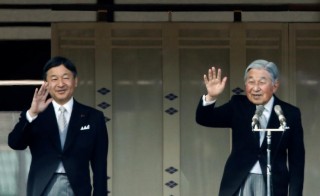Loading
Search
▼ Japan Considers 10 Consecutive Days Off Around Crown Prince's Succession
- Category:Event
TOKYO - Japan is considering having 10 consecutive days off from April 27 to May 6 in 2019 to coincide with Crown Prince Naruhito's succession to the throne on May 1, government sources said Wednesday.
April 29 and May 3-6 are already assigned as national holidays in 2019, following the weekend of April 27 and 28. If May 1 is designated as a national holiday, April 30 and May 2 would become public holidays. Japanese holiday law stipulates that a weekday sandwiched by national holidays automatically becomes a public holiday.
Three of the days, from April 29 to May 1, are related to the imperial family with Emperor Akihito scheduled to abdicate on April 30, a day after the national holiday of Showa Day when people commemorate the birthday of the emperor's father Hirohito.
The government hopes for a smooth succession and warm celebrations by the public during the 10 consecutive days off, without the change of gengo (era name) used in the Japanese calendar causing any disruption.
The government will discuss whether to maintain the current emperor's birthday (Dec 23) as a national holiday and will examine how best to organize the imperial rituals of abdication and succession, according to the sources.
A one-time special holiday was issued on Monday Nov 12, 1990 when Emperor Akihito's succession ceremony was held.
If the government chooses to make May 1 in 2019 a one-off but not national holiday, April 30 and May 2 will remain as weekdays.
Japan's parliament enacted a law in June to allow the emperor, who will be 84 on Dec 23, to pass the throne on to his 57-year-old son. This came after the emperor shared his concerns about his age in a rare video message broadcast in August 2016, which was interpreted as him expressing his wish to step down.
Prime Minister Shinzo Abe said on Friday that the emperor is expected to abdicate on April 30 in 2019, marking the nation's first succession from a living emperor in about 200 years.
© KYODO
April 29 and May 3-6 are already assigned as national holidays in 2019, following the weekend of April 27 and 28. If May 1 is designated as a national holiday, April 30 and May 2 would become public holidays. Japanese holiday law stipulates that a weekday sandwiched by national holidays automatically becomes a public holiday.
Three of the days, from April 29 to May 1, are related to the imperial family with Emperor Akihito scheduled to abdicate on April 30, a day after the national holiday of Showa Day when people commemorate the birthday of the emperor's father Hirohito.
The government hopes for a smooth succession and warm celebrations by the public during the 10 consecutive days off, without the change of gengo (era name) used in the Japanese calendar causing any disruption.
The government will discuss whether to maintain the current emperor's birthday (Dec 23) as a national holiday and will examine how best to organize the imperial rituals of abdication and succession, according to the sources.
A one-time special holiday was issued on Monday Nov 12, 1990 when Emperor Akihito's succession ceremony was held.
If the government chooses to make May 1 in 2019 a one-off but not national holiday, April 30 and May 2 will remain as weekdays.
Japan's parliament enacted a law in June to allow the emperor, who will be 84 on Dec 23, to pass the throne on to his 57-year-old son. This came after the emperor shared his concerns about his age in a rare video message broadcast in August 2016, which was interpreted as him expressing his wish to step down.
Prime Minister Shinzo Abe said on Friday that the emperor is expected to abdicate on April 30 in 2019, marking the nation's first succession from a living emperor in about 200 years.
© KYODO
- December 7, 2017
- Comment (0)
- Trackback(0)


